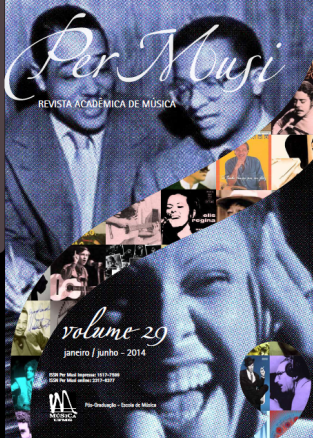“Duke Ellington está deserdando o jazz?”
eruditização da improvisação em Diminuendo and crescendo in blue
Palavras-chave:
Diminuendo and crescendo in blue de Duke Ellington, Composição e improvisação no jazz, Eruditização da música popularResumo
Desde o início de sua carreira como compositor e líder de orquestra de jazz nos anos de 1920, Duke Ellington tem sido comparado a compositores eruditos europeus como Delius e Debussy. Declarações como a de Constant LAMBERT (1934), de que Duke Ellington estabeleceu “um padrão pelo qual podemos julgar. . .compositores eruditos” se concentraram em procedimentos composicionais complexos de sua obra. Seguindo outra direção, o presente estudo examina a interseção entre os estilos erudito e jazzístico, por meio da análise de seções tipicamente improvisadas de Ellington. O desenvolvimento do solo improvisado de saxofone barítono de Diminuendo and crescendo in blue (1937) indicam o estabelecimento de solos fixos no repertório de sua orquestra. O grau de elaboração composicional aí implícito sugere outras implicações.
Referências
AVAKIAN, G. Ellington at Newport. Notas do encarte do LP original. In: Duke Ellington at Newport (complete). Columbia Jazz Legacy, 1956 (Relançamento Sony Music Entertainment, 1999, C2K 64932).
BERLINER, P. Thinking in jazz: the infinite art of improvisation. Chicago, Londres: The University of Chicago Press, 1994.
COOK, N. Making music together, or improvisation and its others. In: Music, performance, meaning; selected essays. Aldershot: Ashgate, 2007, p.321-341 (Traduzido por Fausto Borém e publicado em Per Musi, v.16, 2007, p.7-20).
HAMMOND, J. Is the Duke deserting Jazz? In: The Duke Ellington reader. M. Tucker (Ed.). Oxford: Oxford University Press, 1993, p.171-185 (publicado anteriormente em 1943).
CARNEY, Harry. http://www.nme. com/artists/harry-carney. In: nme.com. (Acesso em 30 de maio, 2010).
KATZ, M. Capturing sound: how technology has changed music. Berkeley: University of California Press, 2004.
LAMBERT, C. Music Ho! a study of music in decline. Londres: Faber and Faber, 1934.
LONG, P. Entrevista de Pete Long com a autora. Beckhamsted: 2009.
NETTL, B. Thoughts on improvisation: a comparative approach. The Musical Quarterly. 1974, n.60, p.1-19.
OWENS, T. Charlie Parker: techniques of improvisation. Los Angeles: University of California, 1974. (Tese de Doutorado).
SCHULLER, G. The Swing Era: the development of jazz, 1930–1945. Oxford: Oxford University Press, 1989.
______. Sonny Rollins and the challenge of thematic improvisation. In: Musings: the musical worlds of Gunther Schuller. Nova Iorque: Da Capo Press, 1999, p.86-97.
VAN DE LEUR, W. Something to live for: the music of Billy Strayhorn. Oxford: Oxford University Press, 2002.
Downloads
Publicado
Edição
Seção
Licença
Copyright (c) 2014 Per Musi

Este trabalho está licenciado sob uma licença Creative Commons Attribution 4.0 International License.

Exceto onde está indicado, o conteúdo neste site está sob uma Licença Creative Commons - Atribuição 4.0 Internacional.












